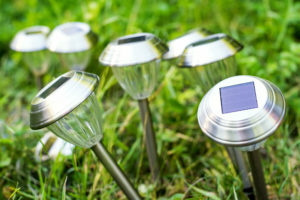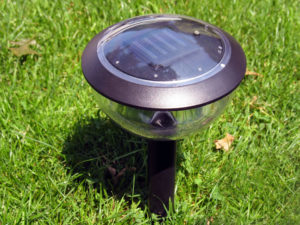Have you ever thought of elevating the look of your balcony and home? Solar lights are an excellent way to light your garden and pathways at night.
Solar-powered lights need direct sunlight to charge during the day and release the same energy as light at night. The larger the solar panel, the better the illumination the light provides. Solar lights come with rechargeable batteries.
These batteries usually last a few years if kept clean. Solar light primarily functions outdoors and thus accumulates dust and debris relatively quickly. Accumulation of dust and debris on the solar panel affects the functioning of these lights.
Hence, you must clean them mindfully to maintain their efficiency and lifespan. Furthermore, these lights don’t perform entirely on cloudy and winter days and thus must be stored away to sustain them for a long time.
So, with all these issues with solar lights, how can you get the best out of your investment? Is it possible to seal a solar garden light? Below are a few tips and tricks to help you sustain solar lights for an extended time.
Contents
Key Takeaways
- Solar lights should be sealed with silicone sealant to prevent moisture from damaging them during winter or rainy days.
- Regular maintenance is crucial for efficient solar light performance, including cleaning the solar panel fixtures and checking for damage to wires and batteries.
- Use NiMH batteries for longer lifespan and eco-friendliness in solar lights to maintain their functionality over time.
Sealing Solar Lights with Silicone Sealant
Although solar lights are durable and can survive the winter, storing them away is always advisable. Or seal them to ensure the outdoor lights are not damaged in winter.
To seal a solar light, you will need a translucent kitchen silicone sealant and a piece of polythene bag or a brush. Take the brush to apply the silicone sealant on the top of the solar light. Use the brush to apply even layers of the sealant to the light to get a clean result.
The sealant will prevent moisture penetration to the internals, solar cells, and solar panels of the light. So, cover up any holes, seams, or voids on the light to seal any possible moisture entry into the device.
Don’t panic if the sealing process becomes a mess while using the silicone. Instead, use a cotton bud moistened with acetone to clean the mess neatly, and you can continue with the process.

How to Maintain Solar Lights
Sealing solar light is just a part of waterproofing it to prevent any possible damage from moisture during cold, grey, rainy days and frost. You must regularly maintain the device to ensure that the solar-powered lights work efficiently for a long time.
Below are a few things that must be done at regular intervals to ensure the proper functioning of the solar lights.
Try Pruning The Trees And Shrubs Nearby
Solar lights rely on the sun for energy and thus must be placed at a location with ample sunlight. Make sure you prune any nearby bushes, shrubs, and trees that block the sunlight for the solar device.
Clean the Solar Panels Mindfully
Cleaning your solar lights is essential and plays a vital role in sustaining these devices for a long time. Dust accumulation on the solar panel of the lights will hinder its capacity and efficiency to charge. Even the circuit board can be damaged.
It would be best to clean your solar garden lights with a soft cloth moistened with dish soap. You might also need a soft-bristled brush to dust off any stubborn debris and dust. Generally speaking, you must clean the solar panels either early or late in the day.
It’s advisable to clean the solar panels about once a month for optimum functioning of the lights. However, if you live in an arid area, you might need to repeat this cleaning process more often.
Clean the Fixtures and Globes
It’s not not just your solar light that needs cleaning regularly but the globes and fixtures of your landscape lights. Doing this will enhance the visual appeal and extend the life of these plastic components.
You can clean the fixtures and globes in the same manner as the lights. And while you’re at it, you must also inspect the fixtures and globes for any damage.
Check The Solar Lights For Any Damage
You must check your solar light regularly for any damage. This includes the wires connecting the solar panels and fixtures as well. Although many of the solar lights are wireless, a few are not. And if your device falls in the latter category, you must also mindfully check the wires.
Even though these wires are well hidden and protected, it’s possible for your pets or any stray animal to damage them by chewing.

Regularly Check the Batteries
You must regularly check the battery of the solar lights for corrosion. Corrosion hinders the charging capacity of the batteries and results in malfunctioning of the solar outdoor lights.
While inspecting the batteries for corrosion, look for white dust and dust them off with a soft-bristle brush. If the corrosion is light, it will be quickly dusted off the brush. However, you must repeat the same process with fine-grit sandpaper instead.
If batteries are corroded, you might consider replacing them. Additionally, try to replace your batteries with NiMH (Nickel Metal Hydride) batteries instead of NiCd batteries.
NiMH batteries have a longer lifespan and are relatively more eco-friendly than (NiCd) alkaline batteries.
Case Study: Enhancing the Longevity of Solar Lights Through Proper Sealing and Maintenance
Background
At Solar Panels Network USA, we understand the importance of maximizing the lifespan and efficiency of solar lights for our clients. This case study outlines our approach to helping a homeowner seal and maintain their solar lights, ensuring they remain bright and functional throughout the year.
Project Overview
A homeowner sought our assistance to enhance the durability and performance of their outdoor solar lights, particularly during the winter months. The primary objectives were to protect the lights from moisture, prevent damage from debris, and ensure consistent illumination.
Initial Consultation and Assessment
Understanding the Client’s Needs
We began with a comprehensive consultation to understand the homeowner’s specific requirements and the types of solar lights in use. This included an assessment of the installation locations and the environmental challenges faced, such as exposure to rain and snow.
Site Survey and Light Condition Analysis
A detailed site survey was conducted to inspect the current condition of the solar lights. We identified areas where moisture ingress was likely and where dust and debris accumulation was affecting the efficiency of the solar panels.
Implementation
Sealing the Solar Lights
Using high-quality translucent kitchen silicone sealant, we sealed the solar lights to prevent moisture from penetrating the internal components. This process involved:
- Cleaning the Lights: Thoroughly cleaning the lights to remove any existing dirt and debris.
- Applying the Sealant: Using a brush to apply an even layer of silicone sealant over the top of the lights, covering all seams, holes, and voids.
- Ensuring a Clean Finish: Using cotton buds moistened with acetone to clean any excess sealant for a neat and professional finish.
Regular Maintenance Routine
We established a maintenance routine to keep the solar lights in optimal condition:
- Pruning Nearby Vegetation: Ensuring that bushes, shrubs, and trees were pruned to prevent shading and maximize sunlight exposure.
- Cleaning Solar Panels: Instructing the homeowner on how to clean the solar panels monthly using a soft cloth moistened with dish soap and a soft-bristled brush for stubborn debris.
- Inspecting Fixtures and Batteries: Regularly checking fixtures for damage and batteries for corrosion, replacing them with NiMH batteries to enhance longevity and performance.
Results
Improved Light Performance
Following the sealing and maintenance procedures, the solar lights showed a marked improvement in performance. The lights remained bright and functional throughout the winter, providing consistent illumination despite the harsh weather conditions.
Extended Lifespan
The protective measures taken, including sealing and regular maintenance, significantly extended the lifespan of the solar lights. The homeowner reported fewer instances of malfunction and reduced need for replacements.
Enhanced Aesthetic Appeal
By ensuring the fixtures and globes were clean and free from damage, the solar lights maintained their aesthetic appeal, enhancing the overall look of the garden and pathways.
Summary
Our expertise in solar lighting solutions enabled us to provide effective strategies for sealing and maintaining solar lights. By applying silicone sealant, establishing a regular maintenance routine, and recommending the use of NiMH batteries, we helped the homeowner achieve long-lasting, efficient, and aesthetically pleasing solar lighting. This case study highlights the importance of proactive care and proper sealing in preserving the functionality and appearance of solar lights.
Expert Insights From Our Solar Panel Installers About Sealing Solar Lights
Properly sealing your solar lights with silicone sealant can significantly extend their lifespan by protecting them from moisture and harsh weather conditions. This simple step ensures your lights remain functional and bright all year round.
Lead Solar Engineer
Regular maintenance, including checking for damaged wires and cleaning the solar panels, is crucial for the efficiency of your solar lights. Ensuring they are free from dust and debris can make a noticeable difference in their performance.
Senior Solar Technician
Using NiMH batteries instead of NiCd can enhance the longevity and eco-friendliness of your solar lights. Regularly inspecting and replacing corroded batteries is key to maintaining optimal functionality.
Renewable Energy Specialist
Our Expertise in Solar Lights
At Solar Panels Network USA, we’re here to provide you with valuable information and support regarding solar lighting. With our experience and understanding of the solar lighting industry, our team of experts is prepared to assist you in finding the right lighting solution for your needs. Whether you’re interested in improving your outdoor spaces, conserving energy, or adopting a more sustainable approach, we’re well-equipped to help. Please feel free to contact us with any questions or inquiries.
Endnotes
Solar lights can easily withstand harsh weather conditions and have an IPX3 rating. However, even still, your solar lights can have a water ingress, which can damage the device completely.
Therefore, you must seal your solar lights and perform regular maintenance to sustain them for a long time.
About the Author
Solar Panels Network USA stands at the forefront of solar energy solutions, driven by a team of seasoned solar engineers and energy consultants. With over decades of experience in delivering high-quality solar installations and maintenance, we are committed to promoting sustainable energy through customer-centric, tailored solutions. Our articles reflect this commitment, crafted collaboratively by experts to provide accurate, up-to-date insights into solar technology, ensuring our readers are well-informed and empowered in their solar energy decisions.

